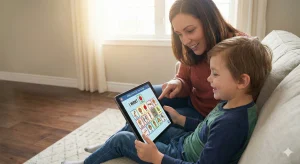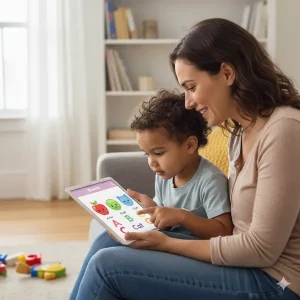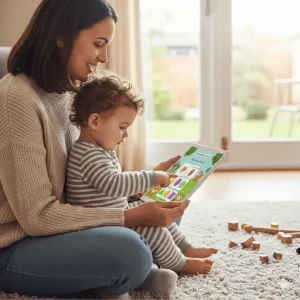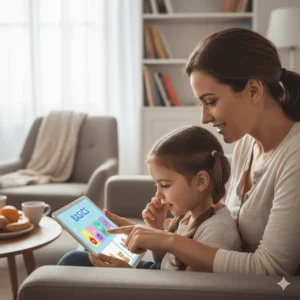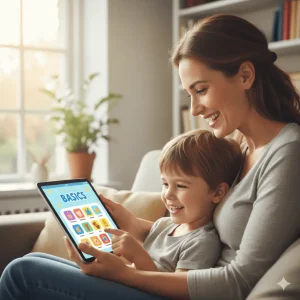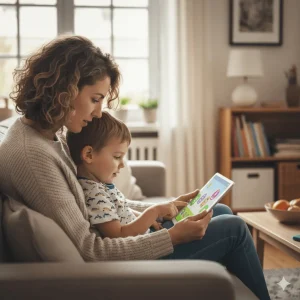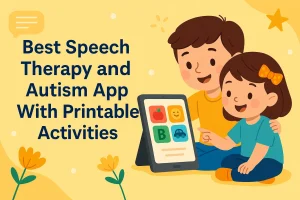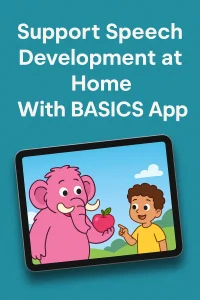How BASICS App Helped My Child Speak Again in 3 Weeks
By Wellness Hub
Last Updated: October 16, 2025
When my four-year-old stopped using the few words he once knew, our home grew quieter in ways that worried me. We tried picture books, songs, and flashcards, but nothing seemed to spark his interest or help the words come back. That’s when I discovered BASICS App — a play-based speech and learning app designed by therapists.
Instead of drills or worksheets, BASICS App invited my child to learn through games, visuals, and everyday routines. In just three weeks, I began to notice small but powerful changes — eye contact, imitation, and the first attempts at speech returning through laughter and play.
This isn’t a quick-fix story — it’s about how structured, consistent, and engaging play can reignite communication. Here’s how BASICS helped us rebuild confidence, one word at a time.
The Struggle Before using BASICS App
When my 4-year-old suddenly stopped using the few words he knew, I felt lost. His speech had regressed — the clear “mama” and “ball” turned into sounds and gestures that no one could understand. Like many parents facing speech delay or unclear speech, I spent hours searching online for help, hoping to find a way to make him talk again.
I started with traditional methods — printed worksheets, flashcards, that claimed to boost speech. But nothing seemed to hold his attention for more than a few minutes. The tasks were repetitive, the visuals were dull, and there was no sense of interaction. He grew frustrated easily, and I realized that what he needed wasn’t more rote practice — it was engaging, structured play that could spark curiosity and motivate him to participate.
As a parent, it was painful to watch him withdraw whenever I tried to “teach.” He preferred playing with toys or tapping on screens, but those activities didn’t guide his language. That’s when I started looking for a solution that blended fun with speech learning, something that could turn his playtime into real communication practice. I learned that early speech development depends on interactive, multi-sensory learning — hearing, seeing, and doing — not just repeating words on paper.
That search led me to discover the importance of play-based speech therapy apps that build language through repetition, visuals, and meaningful feedback. I didn’t know it yet, but the right structure and approach could turn my child’s curiosity into progress — and that’s exactly what BASICS was designed to do.
Discovering BASICS App: A Parent’s Turning Point
Like many parents searching for help with speech delay, I spent weeks exploring every possible resource — flashcards, videos, and DIY speech exercises. Nothing seemed to hold my child’s attention for long. That’s when a speech therapist recommended the BASICS App, describing it as a structured, play-based speech therapy app designed by experts for children who learn best through visuals and repetition.
Curious, I looked up reviews and videos about BASICS speech app and discovered how it combines therapist-designed lessons with child-friendly games. What instantly stood out to me was the Goal Mode — a feature that allows parents to set personalized learning goals based on their child’s developmental needs. Each goal focuses on specific speech and language milestones, like first words, articulation, WH questions, or sentence building.
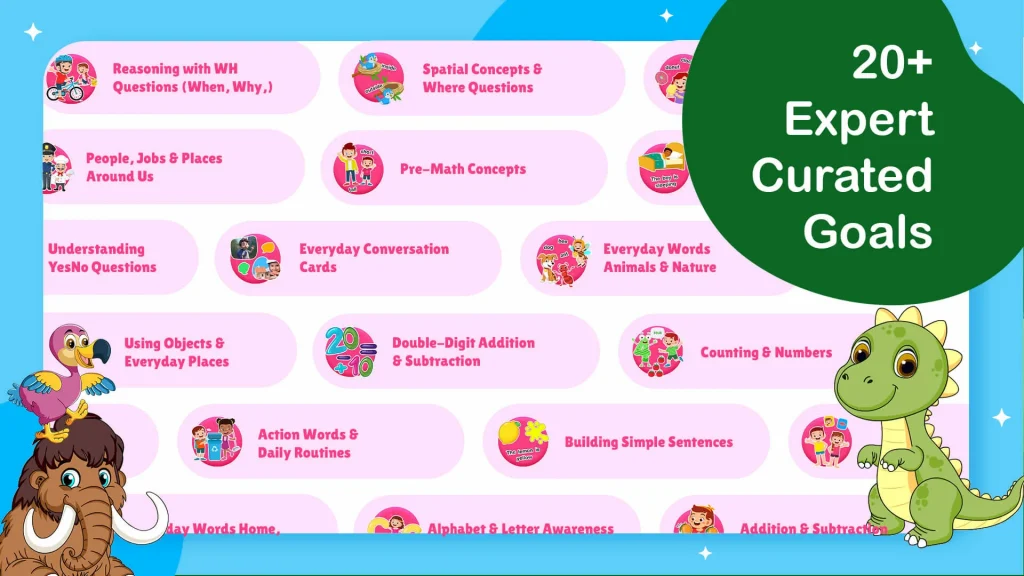
The first time my child used BASICS App, I noticed an immediate change. The colorful visuals, gentle voice prompts, and interactive animations drew my child in within seconds. It felt more like play than practice — yet I could see learning happening in real time. When my child tapped on animal names or repeated sound prompts, the response was instant and encouraging. That engagement was something no worksheet or flashcard had ever achieved.
Within days, BASICS App became a part of our daily routine — 10 to 15 minutes after snack time, just like Storytime. I realized this was more than an app; it was a bridge between therapy and home practice, making speech learning fun, consistent, and measurable. For the first time, my child looked forward to “talking time,” and I felt hopeful again.
First Week — Reconnecting Through Play
When we started using the BASICS App, I didn’t expect immediate results — but within the first week, I noticed small, meaningful changes. My child, who had lost interest in speaking, suddenly began to engage again — not through pressure, but through playful learning. This early phase was all about speech delay progress through structured play, and BASICS App made it easy to blend fun with focus.
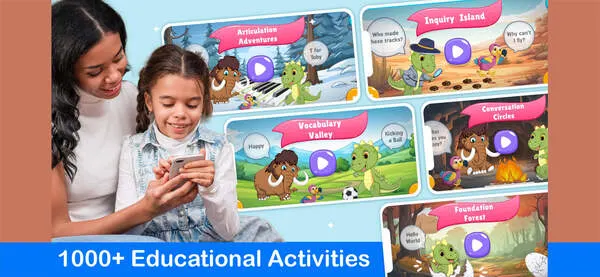
One of the first sets we tried came from Foundation Forest, the app’s Level 1 designed to strengthen attention, memory, and early learning. The Matching games were simple yet captivating. My child loved tapping pairs of animals, fruits, and toys — each success was rewarded with cheerful sounds and animations. This built instant motivation while quietly teaching observation, listening, and recall — essential foundations for speech recovery.
Next came Animal Sounds, a turning point in our week. The app played realistic sounds — a barking dog, a mooing cow — followed by a picture cue. My child began to mimic these sounds, giggling between each attempt. It was the first time I’d heard vocal play in months. The BASICS method of combining visuals with sound repetition helped strengthen recognition and encouraged imitation, the first step toward rebuilding speech.
By midweek, we explored Early Vocabulary Sets, which included familiar objects like “apple,” “car,” and “ball.” The repetition was key — the app repeated each word with clear articulation, prompting my child to point, tap, and eventually try saying them aloud. Unlike passive screen time, these activities required active participation, improving both focus and expressive language.
The structured progression within Foundation Forest played a major role in rebuilding attention and communication. Each short task held my child’s focus just long enough to achieve success, reinforcing confidence and cognitive engagement. Within a few days, I noticed more eye contact, better listening, and attempts at vocalizing names of everyday items — subtle but powerful signs of speech development progress.
That first week taught me something vital: children don’t just need words — they need the right environment to rediscover them. Through visuals, repetition, and structured play, BASICS App helped my child reconnect with the joy of communication, one tap and one word at a time.
The Second Week — From Sounds to Words
During the second week of using the BASICS App, I started noticing real speech development progress in my child. What began as simple babbling and sound play slowly turned into meaningful word attempts. The app’s video modeling feature in the Word Wonders section became a turning point — it showed short, clear clips of familiar objects and actions, paired with expressive voice cues. This combination of visuals and sounds made it easier for my child to imitate speech patterns naturally.
Each day, we followed a short, consistent routine: about 10 to 15 minutes of BASICS App after meals or before bedtime. These short sessions worked wonders because my child stayed engaged without feeling pressured. The repetition of words like “eat,” “run,” “ball,” and “car” helped strengthen both receptive and expressive language.
The Word Wonders activities focused on naming real-world objects, which encouraged my child to copy sounds and recognize everyday vocabulary. By hearing the same words through visuals, animation, and voice prompts, my child’s speech clarity started improving. Even small imitations — like saying “ba” for ball — were huge milestones that built confidence.
By the end of week two, I could clearly see my child trying to match the words and lip movements shown on screen. It wasn’t just imitation anymore — it was communication taking shape. These daily interactions through the BASICS App made speech learning part of our playtime, not a chore, and helped bridge the gap from sounds to spoken words in a way that felt fun, natural, and rewarding.
The Third Week — Words Became Sentences
By the third week of using the BASICS speech app, I began noticing something remarkable — my child was finally connecting words into short, meaningful sentences. The change didn’t happen overnight, but the steady rhythm of daily practice started paying off.
What made the biggest difference were the activities from Phrase Park and Sentence Symphony, two BASICS levels designed to help children move from single words to full sentences. In Phrase Park, my child practiced two- and three-word combinations like “eat apple,” “push car,” “open door.” These short, play-based exercises encouraged understanding of verb–object relationships, helping speech become more functional and expressive.
As we transitioned to Sentence Symphony, the visuals became richer and the prompts more interactive. My child learned to describe actions and identify who was doing what — for example, “The boy is running” or “The girl is painting.” The use of pictures, voice cues, and repetition made it easier for him to imitate full sentences naturally, rather than repeating single words.
Then came the moment I’ll never forget — he pointed at his cup and clearly said, “I want water.” It was simple, yet powerful. That short sentence carried months of effort, patience, and quiet hope. It felt like we had crossed an invisible bridge — from silence to speech, from guessing needs to hearing real communication.
Every day after that, he added new words, new actions, and new confidence. BASICS didn’t “fix” speech magically; it guided us through a structured path of progress — from sound imitation to naming, and finally to sentence-building. What stood out was how the app blended therapist-designed activities with a child’s natural curiosity, creating learning moments that felt more like play than therapy.
The improvement was gradual, realistic, and deeply encouraging. Watching him combine words and express feelings showed that consistent, structured play-based learning truly works. BASICS helped rebuild not just my child’s speech, but also my confidence as a parent — proving that progress happens one small sentence at a time.
Lessons for Other Parents: Practical Tips for Parent for Speech Development at Home
Every parent of a late talker wants to help their child communicate better—but knowing how to start can feel overwhelming. After seeing my own child’s progress with the BASICS speech development app, I realized that real improvement comes from small, intentional steps done consistently at home. These lessons will help any parent looking for practical speech therapy tips for toddlers at home using play-based, structured learning.
Keep Sessions Short and Consistent
Short, daily sessions are far more effective than long, irregular ones. We began with just 10–15 minutes of speech practice using BASICS App twice a day. This approach helped maintain focus and prevented fatigue, making learning a natural part of our routine. Over time, these mini sessions added up to major improvements in my child’s speech and language development at home.
Focus on Fun Before Fluency
Fluency grows from enjoyment, not pressure. Instead of pushing for perfect pronunciation, I focused on keeping activities fun and engaging. The interactive visuals and rewards in BASICS App turned every task into a playful moment. When learning feels like a game, children participate willingly—and this leads to better imitation, confidence, and clearer speech over time.
Pair BASICS Activities With Real-Life Naming
Linking digital practice to real-life experiences made the biggest difference. After completing a BASICS vocabulary or action set, I’d point out everyday objects like “apple,” “car,” or “brush” and encourage my child to name them. This simple habit of connecting BASICS speech activities with real-life naming helped strengthen recall, expand vocabulary, and build spontaneous communication beyond the screen.
Observe Small Wins — Progress Isn’t Linear
Speech progress rarely happens in a straight line. Some days your child may surprise you with new words; other days might seem slower. By tracking even tiny milestones—like attempting a new sound or answering a simple “what” question—you’ll stay motivated and recognize how consistent parent-led speech therapy at home truly works. Every small win builds toward long-term success.
Parent involvement is the foundation of any child’s communication growth. Through structured, engaging practice in BASICS App and a bit of daily effort, parents can turn ordinary moments into learning opportunities and support their child’s journey toward confident speech.
After three weeks of consistent practice with the BASICS speech app, the change in my child was more than just about words — it was about confidence, focus, and connection. Each day’s short session turned into a joyful moment of discovery. What began as hesitant sounds soon became clearer speech and playful conversations that brought back the spark we were missing.
Below is a simple summary of how the BASICS app transformed our routine and communication in just three weeks:
| Area of Progress | Before Using BASICS | After 3 Weeks With BASICS App | Keywords Integrated |
|---|---|---|---|
| Speech Clarity | Limited sounds, frequent pauses, unclear pronunciation | Clearer words, better articulation, consistent verbal attempts | speech clarity improvement, articulation progress |
| Confidence & Motivation | Hesitant to speak, avoided eye contact | Spoke voluntarily during play, showed excitement to repeat words | child speech confidence, BASICS motivation for kids |
| Attention Span | Lost focus within minutes | Sustained attention through visuals and sounds | improve child attention with BASICS |
| Vocabulary Growth | Could say a few isolated words | Started combining words: “Play car,” “Eat apple” | speech development progress, vocabulary growth |
| Family Interaction | Passive during playtime | Joined conversations, responded to names and questions | communication with family, parent-child bonding |
| Daily Routine | Screen time used for cartoons | BASICS became part of evening play — 15 minutes of interactive learning | BASICS play-based learning, family speech routine |
These weren’t overnight results, but steady progress built on play, repetition, and encouragement. The BASICS app didn’t replace therapy — it became our bridge between professional guidance and everyday practice.
Every small win, like saying “mama” clearly or answering “yes” for the first time, felt like a milestone. It reminded me that speech progress happens when learning feels joyful.
For any parent walking the same path — stay consistent, celebrate little victories, and trust the process.
With hope, persistence, and structured support, communication growth is always possible.
3 Weeks Later — A New Beginning
After three weeks of consistent practice with the BASICS speech app, the change in my child was more than just about words — it was about confidence, focus, and connection. Each day’s short session turned into a joyful moment of discovery. What began as hesitant sounds soon became clearer speech and playful conversations that brought back the spark we were missing.
Below is a simple summary of how the BASICS app transformed our routine and communication in just three weeks:
| Area of Progress | Before Using BASICS | After 3 Weeks With BASICS App | Keywords Integrated |
|---|---|---|---|
| Speech Clarity | Limited sounds, frequent pauses, unclear pronunciation | Clearer words, better articulation, consistent verbal attempts | speech clarity improvement, articulation progress |
| Confidence & Motivation | Hesitant to speak, avoided eye contact | Spoke voluntarily during play, showed excitement to repeat words | child speech confidence, BASICS motivation for kids |
| Attention Span | Lost focus within minutes | Sustained attention through visuals and sounds | improve child attention with BASICS |
| Vocabulary Growth | Could say a few isolated words | Started combining words: “Play car,” “Eat apple” | speech development progress, vocabulary growth |
| Family Interaction | Passive during playtime | Joined conversations, responded to names and questions | communication with family, parent-child bonding |
| Daily Routine | Screen time used for cartoons | BASICS became part of evening play — 15 minutes of interactive learning | BASICS play-based learning, family speech routine |
These weren’t overnight results, but steady progress built on play, repetition, and encouragement. The BASICS app didn’t replace therapy — it became our bridge between professional guidance and everyday practice.
Every small win, like saying “mama” clearly or answering “yes” for the first time, felt like a milestone. It reminded me that speech progress happens when learning feels joyful.
For any parent walking the same path — stay consistent, celebrate little victories, and trust the process.
With hope, persistence, and structured support, communication growth is always possible.
Conclusion
Watching my child rediscover their voice reminded me that progress doesn’t always come from pressure — it comes from play, consistency, and connection. The BASICS App didn’t replace therapy; it reinforced it through everyday moments that felt more like games than lessons.
In just three weeks, the change wasn’t only in my child’s words but in their confidence and joy while communicating. From hesitant gestures to clear requests and cheerful chatter, every small win felt like a milestone worth celebrating.
For parents who feel uncertain about where to begin, know that small, structured steps; like spending a few minutes daily with BASICS App; can gently guide your child toward communication breakthroughs. It’s not magic; it’s meaningful practice, designed to meet your child right where they are.
About Wellness Hub
Wellness Hub is a trusted digital platform that empowers parents, caregivers, and professionals with science-backed tools for childhood development. From online speech therapy to home therapy resources, we offer a holistic ecosystem for children facing speech delays, autism, ADHD, and other developmental challenges.
Rooted in evidence-based practices and delivered by certified experts, Wellness Hub bridges the gap between accessibility and quality care. Whether you need at-home speech strategies, developmental checklists, or interactive mobile apps like BASICS, we make early intervention affordable and family-friendly.
Start your journey today with expert guidance tailored to your child’s unique communication and learning needs—anytime, anywhere.
Frequently Asked Questions
1. Is BASICS App a free speech therapy app for kids?
BASICS offers free introductory levels so parents can explore core activities like matching, sound imitation, and early words. Additional structured levels are part of the full version, giving access to hundreds of therapist-designed exercises for ongoing speech and language practice.
2. Can I use BASICS App without a therapist?
Yes. BASICS is designed so parents can guide speech practice independently at home. Each goal comes with simple visual prompts, voice models, and progress tracking, making it easy to use even without formal therapy experience.
3. How does BASICS App support children with autism?
BASICS uses structured visuals, predictable play, and voice feedback to improve attention, imitation, and communication. Its calm, reward-based environment helps children with autism engage safely while developing speech, comprehension, and social responses.
4. What age group is BASICS App ideal for?
The BASICS app is ideal for children aged 2 to 8 years, covering developmental levels from early word learning to sentence building, comprehension, reasoning, and pre-math. Parents can select goals that match their child’s current ability rather than age alone.
5. How long should my child use BASICS App daily?
For best results, aim for 10–15 minutes a day. Short, consistent sessions keep children engaged and reinforce learning. Parents can also repeat favorite activities or use “Goal Mode” to build daily routines.
6. Is BASICS available offline or on multiple devices?
Yes. BASICS supports offline access once activities are downloaded. Families can log in on multiple devices under the same account, making it easy to continue practice during travel or shared routines.
7. How quickly can I expect progress in my child’s speech?
Every child learns differently, but many parents notice early improvements in attention, imitation, and sound use within a few weeks of regular practice. BASICS focuses on gradual, meaningful progress rather than instant results.
8. Does BASICS include activities for nonverbal children?
Absolutely. BASICS starts with imitation, matching, and sound identification to help nonverbal children engage before moving toward single words and short phrases. Video modeling and visual supports make early communication accessible.
9. Can BASICS be used alongside professional therapy?
Yes. Many therapists recommend BASICS as a home-practice companion between sessions. It reinforces goals from speech, occupational, or behavioral therapy while giving parents structured feedback.
10. Is BASICS suitable for bilingual or multilingual homes?
Yes. BASICS focuses on universal language foundations like object naming, matching, and question answering. Parents can practice in their preferred language alongside the app prompts, helping children build skills across both languages.
Book your Free Consultation Today
Parent/Caregiver Info:
Client’s Details:
* Error Message
